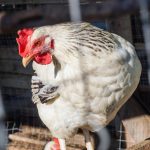Winterizing a chicken coop is crucial for maintaining the health and comfort of chickens during cold weather. The process begins with a thorough inspection of the coop for drafts and leaks. Walls, windows, doors, and the roof should be checked for gaps or cracks, which can be sealed with weather stripping or caulking to improve insulation.
Additional insulation can be added to walls and ceilings using materials such as foam board, straw bales, or recycled denim insulation. Proper ventilation is essential to prevent moisture buildup while avoiding drafts. This balance helps maintain a comfortable environment for the chickens throughout winter.
Adequate bedding is another key component of winterizing. Deep litter bedding, made from materials like straw or wood shavings, serves multiple purposes. It insulates the coop floor, provides warmth for the chickens, absorbs moisture, and controls odors.
Regular maintenance of the bedding, including turning and adding fresh material, helps preserve its insulating properties. Installing roosts for chickens to perch on is important to keep them off the cold floor and prevent frostbite on their feet. By implementing these winterizing measures, chicken owners can ensure their flock remains warm and healthy during the colder months.
Table of Contents
- 1 Providing Adequate Ventilation
- 2 Insulating the Coop
- 3 Maintaining a Consistent Light Source
- 4 Ensuring Proper Nutrition
- 5 Protecting Against Frostbite
- 6 Monitoring Water Sources
- 7 FAQs
- 7.1 What are the key considerations for keeping chickens during winter?
- 7.2 How can I keep my chicken coop warm during winter?
- 7.3 What should I feed my chickens during winter?
- 7.4 How can I prevent my chickens’ water from freezing during winter?
- 7.5 Are there any special health considerations for chickens during winter?
Key Takeaways
- Clean out the coop and add extra bedding to keep chickens warm during winter
- Ensure proper ventilation to prevent moisture buildup and ammonia levels
- Insulate the coop with materials like straw or foam boards to retain heat
- Install a timer for consistent light source to maintain egg production
- Provide a balanced diet with extra protein and vitamins to support chickens’ health
- Check for signs of frostbite on combs and wattles, and apply petroleum jelly for protection
- Monitor water sources to prevent freezing and provide warm water to chickens
Providing Adequate Ventilation
Why Ventilation Matters
Providing adequate ventilation in the coop is crucial for maintaining a healthy environment for your chickens during the winter months. Proper ventilation helps to remove excess moisture from the air, which can lead to respiratory issues and frostbite in chickens. It also helps to regulate the temperature inside the coop, preventing it from becoming too humid and stuffy.
Methods for Providing Ventilation
One way to provide ventilation in the coop is by installing adjustable vents or windows that can be opened and closed as needed. This allows you to control the airflow and temperature inside the coop, ensuring that it remains comfortable for your flock. Another method of providing ventilation in the coop is by using a ridge vent or cupola. These are installed at the peak of the roof and allow warm, moist air to escape from the coop while preventing drafts from entering.
Additional Tips for Promoting Airflow
Ensuring that there is proper space between the roof and the top of the walls can also help to promote airflow in the coop. This, combined with the use of adjustable vents or windows and ridge vents or cupolas, can help to maintain a consistent airflow without creating cold drafts that could harm your chickens.
The Benefits of Proper Ventilation
By providing adequate ventilation in the coop, you can help to prevent respiratory issues, frostbite, and other health problems in your chickens during the winter months.
Insulating the Coop

Insulating the coop is an important step in preparing it for the colder months. Proper insulation helps to regulate the temperature inside the coop, keeping it warm and comfortable for your chickens. One method of insulating the coop is by adding insulation to the walls and ceiling.
This can be done with materials such as foam board, straw bales, or recycled denim insulation. These materials help to trap heat inside the coop and prevent cold air from entering. Additionally, ensuring that there are no gaps or cracks in the walls, windows, doors, or roof can also help to keep the coop insulated.
Another way to insulate the coop is by using curtains or blankets to cover windows at night. This helps to prevent heat loss through the windows and keeps the coop warmer during the coldest part of the day. It’s important to remember to uncover the windows during the day to allow sunlight into the coop and provide natural light for your chickens.
Additionally, adding a layer of plastic sheeting over windows and doors can help to further insulate the coop and keep it warm. By taking these steps to insulate the coop, you can create a cozy and comfortable environment for your chickens during the winter months.
Maintaining a Consistent Light Source
Maintaining a consistent light source in the coop is important for ensuring that your chickens continue to lay eggs throughout the winter months. As daylight hours decrease in the winter, chickens naturally reduce their egg production or stop laying altogether. By providing artificial light in the coop, you can help to simulate longer daylight hours and encourage your hens to continue laying eggs.
One way to maintain a consistent light source in the coop is by installing a timer on a light fixture. This allows you to set specific hours of light each day, ensuring that your chickens receive enough light to continue laying eggs. Another method of maintaining a consistent light source in the coop is by using solar-powered lights or battery-operated LED lights.
These can be placed strategically throughout the coop to provide additional light during the darker winter months. It’s important to remember that chickens need a period of darkness each day to rest and recharge, so it’s best to provide light in the early morning or late evening when natural daylight is minimal. By maintaining a consistent light source in the coop, you can help to ensure that your hens continue laying eggs throughout the winter months.
Ensuring Proper Nutrition
Ensuring proper nutrition for your chickens is crucial for maintaining their health and well-being during the winter months. As temperatures drop, chickens require more energy to stay warm, so it’s important to provide them with a balanced diet that meets their nutritional needs. One way to ensure proper nutrition for your chickens is by offering them a high-quality layer feed that is specifically formulated for egg-laying hens.
This feed should contain essential nutrients such as protein, vitamins, and minerals that are necessary for egg production and overall health. In addition to layer feed, it’s important to provide your chickens with access to fresh water at all times. During the winter months, water sources can freeze, so it’s important to check them regularly and provide heated waterers or break up ice as needed.
Dehydration can lead to health issues such as reduced egg production and increased susceptibility to illness, so ensuring that your chickens have access to water is crucial. Additionally, offering supplemental treats such as scratch grains, mealworms, or fresh fruits and vegetables can help to provide extra energy and nutrients for your flock during the winter months. By ensuring proper nutrition for your chickens, you can help to keep them healthy and thriving throughout the winter.
Protecting Against Frostbite

Understanding Frostbite
Frostbite occurs when exposed skin or tissue freezes, typically on combs, wattles, feet, and legs of chickens.
Prevention Methods
One way to protect against frostbite is by applying petroleum jelly or a similar protective balm to your chickens’ combs and wattles. This helps to create a barrier against cold temperatures and wind chill, reducing the risk of frostbite. Another method of protecting against frostbite is by providing roosts for your chickens to perch on at night. Elevating their feet off of cold surfaces can help to prevent frostbite on their toes and legs.
Coop Maintenance
Additionally, ensuring that there is adequate ventilation in the coop without creating drafts is important for preventing moisture buildup, which can increase the risk of frostbite. By taking these steps to protect against frostbite, you can help to ensure that your chickens stay healthy and comfortable throughout the winter months.
Monitoring Water Sources
Monitoring water sources is crucial for ensuring that your chickens have access to fresh water throughout the winter months. As temperatures drop, water sources can freeze, making it difficult for chickens to stay hydrated. One way to monitor water sources is by checking them regularly throughout the day and breaking up any ice that has formed.
Providing heated waterers or using insulated water containers can also help to prevent water from freezing and ensure that your chickens have access to water at all times. Another method of monitoring water sources is by using automatic waterers with built-in heaters or thermostats that prevent freezing. These can be especially helpful for larger flocks or if you are unable to check water sources multiple times throughout the day.
It’s important to remember that chickens require access to water for drinking as well as for preening their feathers, so ensuring that water sources remain unfrozen is crucial for their health and well-being during the winter months. By monitoring water sources and taking steps to prevent freezing, you can help to ensure that your chickens stay hydrated and healthy throughout the winter.
If you’re looking for tips on how to keep chickens during winter, you might also be interested in learning about the best interior ideas for a chicken coop. Check out this article on chicken coop interior ideas for some helpful suggestions on how to create a cozy and comfortable space for your feathered friends during the colder months.
FAQs
What are the key considerations for keeping chickens during winter?
During winter, it’s important to ensure that chickens have access to fresh water, a warm and dry coop, and adequate nutrition to help them stay healthy and comfortable.
How can I keep my chicken coop warm during winter?
To keep the chicken coop warm during winter, you can insulate the walls and roof, use a heat lamp or heated waterer, and provide plenty of bedding for the chickens to snuggle into.
What should I feed my chickens during winter?
During winter, it’s important to provide your chickens with a balanced diet that includes plenty of protein and nutrients to help them stay healthy and maintain their body temperature. This can include a mix of grains, seeds, and high-quality chicken feed.
How can I prevent my chickens’ water from freezing during winter?
To prevent your chickens’ water from freezing during winter, you can use a heated waterer, place a heated rock or water bottle in the water, or change the water frequently to prevent it from freezing.
Are there any special health considerations for chickens during winter?
During winter, chickens are more susceptible to respiratory issues and frostbite, so it’s important to monitor their health closely and provide them with a warm and dry environment to prevent these issues. Regularly check for signs of illness and provide any necessary medical care.
Meet Walter, the feathered-friend fanatic of Florida! Nestled in the sunshine state, Walter struts through life with his feathered companions, clucking his way to happiness. With a coop that’s fancier than a five-star hotel, he’s the Don Juan of the chicken world. When he’s not teaching his hens to do the cha-cha, you’ll find him in a heated debate with his prized rooster, Sir Clucks-a-Lot. Walter’s poultry passion is no yolk; he’s the sunny-side-up guy you never knew you needed in your flock of friends!







